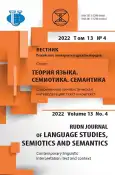Introduction to Psycholinguistic Theory of Intercultural Communication
- Authors: Tarasov E.F.1
-
Affiliations:
- Moscow City University (MPGU)
- Issue: Vol 13, No 4 (2022): CONTEMPORARY LINGUISTIC INTERPRETATION: TEXT AND CONTEXT
- Pages: 861-875
- Section: COGNITIVE RESEARCH
- URL: https://journal-vniispk.ru/2313-2299/article/view/323462
- DOI: https://doi.org/10.22363/2313-2299-2022-13-4-861-875
- ID: 323462
Cite item
Full Text
Abstract
The author analyzes intercultural communication (IC): the speech activity to organize joint activities in a multicultural environment. In course of communication within a single culture, communicants produce speech messages that involve only linguistic signs bodies and require common consciousnesses for understanding. The speaker presents the reality with images of one’s verbally modeled consciousness to the recipient for perception; the latter uses this model to construct the perceived message content from the one’s consciousness images. The sign communication suggests a common language and images of consciousness. There isn’t seen any common consciousness in IC results in cognitive conflicts requiring instructive training to develop common consciousness and language, or an intermediary (interpreter) as a bearer of the proper consciousness. Understanding in IC requires preliminary definitions of key words in speech messages. Understanding with non-linguistic consciousness images among bearers of different ethnic cultures requires a preliminary acquaintance with these images. The theoretical underpinning of understanding in IC can involve A.N. Leontiev’s world image theory and the three-level model of the consciousness image by A.N. Leontiev - V.P. Zinchenko, including existential, reflective and spiritual levels. The world image is knowledge developed by an ethnic culture bearer in the enculturation to navigate in the reality. The existential level contains cognitive means providing for the orientation in the ethnic environment, at the reflexive level, the knowledge about reality ensures the ethnic survival in this reality. At the spiritual level, the consciousness bearer communicates with other individuals resulting in a human attitude to reality.
About the authors
Evgeny F. Tarasov
Moscow City University (MPGU)
Author for correspondence.
Email: eft35@mail.ru
ORCID iD: 0000-0003-2062-0824
Doctor in Philology, Professor, Professor of Directorate of Educational Programs
4, 2-nd Selskohozoyastvenny Str., Moscow, Russian Federation, 129226References
- Berry, J.W., Poortinga, Y.H., Segall, M.H. & Dasen, P.R. (2002). Cross-Cultural Psychology: Research and Applications. Cambridge: Cambridge University Press.
- Matsumoto, D. (2008). Man, culture, psychology. Amazing mysteries, research and discoveries. St. Petersburg: Prime-EVROZNAK publ. (In Russ.).
- Flier, A.Ya. (1997). Modern culturology: object, subject, structure. Social sciences and contemporary world, 2, 124–145. (In Russ.).
- Sapir, E. (1993). Selected works in linguistics and culturology. Мoscow: Progress, Univers. publ. (In Russ.).
- Whorf, B.L. (1960). The relations between behavioral norms and the language. In: New in Linguistics. Vol. I. Moscow: Inostrannaya Literatura publ. pp. 135–168. (In Russ.).
- Prokhorov, A.O. (2021). Mental representations of mental states. Moscow: Institute of Psychology of the Russian Academy of Sciences Publ. (In Russ.).
- Chertov, L.F. (1993). Significance: the experience of theoretical synthesis of ideas about the language method of information communication. St. Petersburg: St. Petersburg University Press. (In Russ.).
- Dubrovsky, D.I. (2002). The problem of the ideal; subjective reality. Moscow: Kanon + publ. (In Russ.).
- Dubrovsky, D.I. (2004). Gnoseology of subjective reality. To the formulation of the problem. Epistemology and Philosophy of Science, II (2), 35–55. (In Russ.).
- Dubrovsky, D.I. (2009). The problem of “another consciousness”. In: The problem of consciousness in philosophy and science, D.I. Dubrovsky (Ed.). Moscow: Kanon + ROOI Rehabilitation publ. (In Russ.).
- Smirnova, N.M. (2006). Transcendental intersubactivity, the problem of “the other minds” and artificial intelligence: an interdisciplinary approach. Moscow: Intell publ. (In Russ.).
- Filatov, V.P. (2005). Methodology of social sciences and the humanities and the problem of “other consciousness”. Epistemology and Philosophy of Science, V (3), 72–82. (In Russ.).
- Wisdom, J. (1968). Other Minds. Oxford: Blackwell.
- Hyslop, A. (1995). Other Minds. Dordrecht: Kluwer.
- Stepin, V.S. (2000). Theoretical knowledge. Moscow: Progress-Tradition publ. (In Russ.).
- Asmolov, A.G. (2007). Psychology of Personality. Cultural-historical understanding of human development. Moscow: Smysl publ. (In Russ.).
- Bartminski, Je. (2005). Linguistic image of the world: essays on ethnolinguistics. Moscow: Indrik. (In Russ.).
- Vygotsky, L.S. (1982–1984). Collected works: In 6 vols. Moscow: Pedagogika Publ. (In Russ.).
- Kon, I.S. (1999). Sociological psychology: Selected psychological works. Moscow: MPSI; Voronezh: Modek publ. (In Russ.).
- Cole, M. (1997). Cultural-historical psychology: the science of the future. Moscow: CogitoCenter publ., Institute of Psychology of the Russian Academy of Sciences Publ. (In Russ.).
- Leontiev, A.N. (2012). Activity. Consciousness. Personality. Moscow: Kniga publ. (In Russ.).
- Bart, R. (1994). Selected Works: Semiotics. Poetics. Moscow: Progress Publishing Group, Univers. (In Russ.).
- Deleuze, G. (1995). Logique de sens [Logic of Meaning]. Moscow: Academia publ. (In Russ.).
- Zinchenko, V.P. (2010). Consciousness and creative act. Moscow: Languages of Slavic cultures publ. (In Russ.).
- Leontiev, A.N. (1983). World image. In: Selected psychological works. Мoscow: Pedagogika publ. (In Russ.).
- Bochkarev, A.I. (2008). Fundamentals of ethnogenesis: Textbook. Мoscow: Flinta — MPSI publ. (In Russ.).
- Vienna Convention on the Law of the Treaties. Done at Vienna on 23 May 1969. URL: https://www.un.org/ru/documents/decl_conv/conventions/law_treaties.shtml (accessed 22.07.2022).
- Leontiev, A.N. (1988). Material on Consciousness. MSU Vestnik, Series Psychology, 3, 6–25. (In Russ.).
Supplementary files









